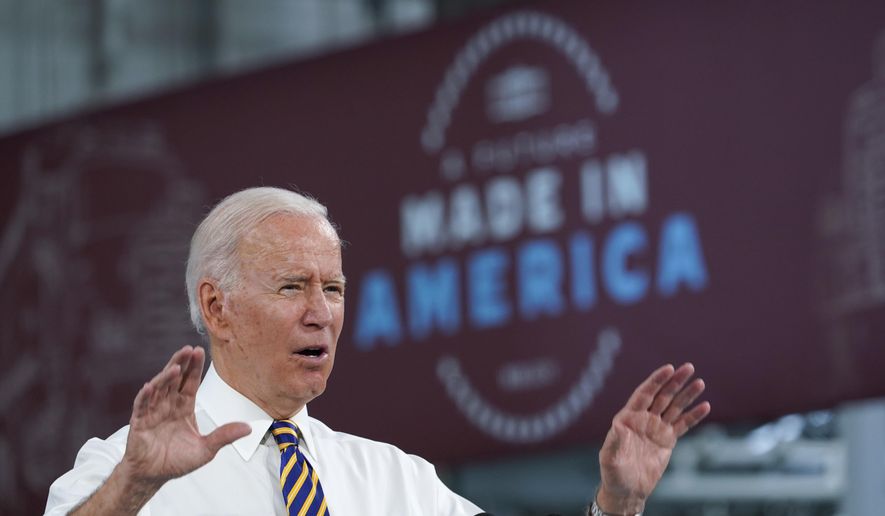President Biden on Wednesday highlighted his new rules to boost federal spending on American-made goods, portraying the proposals as the biggest push for U.S. manufacturing in 70 years.
Mr. Biden said his “Buy American” policy is a way to grow American companies, put more workers in good-paying union jobs, strengthen manufacturing, secure supply change, and confront climate change.
“It’s a straightforward solution — support and grow more American-based companies,” Mr. Biden said. “I can sum it all up in two words: Buy American.”
His remarks came after he toured a Mack Trucks plant in suburban Allentown, Pennsylvania. He also met with members of the United Autoworkers Union, which represents 85% of the 2,500 workers at Mack Trucks’ Lehigh Valley plant.
The union members updated Mr. Biden on Mack Trucks’ new electric-powered garbage trucks, which the company is piloting in New York and North Carolina.
Mr. Biden spoke to the plant workers about his proposals, which the White House unveiled earlier Wednesday. The president has proposed raising the minimum U.S. components for a product to qualify as “Made in the U.S.” to 60% from 55% and, ultimately, 75% by 2029.
“To me, 55% is not substantially all,” Mr. Biden said.
The administration has also proposed tightening domestic purchase requirements to force government contractors to disclose the percentage of domestic content in their products. Currently, contractors are only required to tell the government whether their goods meet the threshold.
Mr. Biden said the government wasn’t checking to verify contractor claims about domestic content.
“Nobody was checking,” he said. “We got a new sheriff in town. We’re going to check.”
Lou Barletta, a Republican candidate for Pennsylvania governor and a former congressman, slammed the plan as political theater. He said Mr. Biden’s agenda is “more anti-worker than any administration in history.
“President Biden is trying to fool Pennsylvanians into thinking he cares about jobs and manufacturing, but he’s been crushing energy sector jobs in Pennsylvania and across the country since he stepped foot in office,” Mr. Barletta said.
The president said the moves will enable the U.S. to bolster its domestic supply chain, after the coronavirus pandemic exposed gaps that left health-care workers scrambling for protective equipment.
“We need to have a resilient supply chain of our own so we are never again at the mercy of countries for critical goods,” he told the crowd.
By tightening the domestic-content rules, the administration would give automobile manufacturers a big boost, as Mr. Biden has sought to replace the government’s fleet of nearly 650,000 cars and trucks with electric vehicles, a proposal in one of his infrastructure packages.
UAW President Ray Curry welcomed the new proposals, saying Mr. Biden was making good on his promise to deliver good-paying union jobs.
“Joe Biden understands what it means to prevent companies from off-shoring those jobs and making sure that we reverse the trend,” Mr. Curry said in a statement.
The federal government spends as much as $600 billion annually on contracts, but a significant portion of that goes to foreign businesses, said Public Citizen, a nonprofit watchdog organization.
It is unclear how much federal contracting goes to foreign countries because some of the funds go to overseas subsidiaries of American corporations, Public Citizen said in a report earlier this year.
Former President Trump had pushed for more aggressive provisions, but his plans hit a snag when other officials argued his proposals could risk backlash from foreign nations and increase costs to U.S. taxpayers.
The Biden administration has dismissed concerns they could also run afoul of foreign trading partners, saying the proposed changes won’t affect products that are inconsistent with Buy American rules.
Still, Mr. Biden has faced foreign opposition to his previous Buy American initiatives.
In January, after Mr. Biden signed an executive order forcing the federal government to buy more U.S. products, Canadian Prime Minister Justin Trudeau raised concerns about the loss of lucrative contracts in a phone call with the president, according to media reports at the time.
• Jeff Mordock can be reached at jmordock@washingtontimes.com.




Please read our comment policy before commenting.